How to advertise online
There are many ways to advertise online. Since costs can escalate quickly, it's important to understand the implications of the different methods.
First of all, online advertising can enable you to generate a high volume of traffic to your website very quickly. It's like injecting steroids into your visibility strategy!
This can be a good option when your Search Engine Optimization (SEO) is weak. SEO efforts can take a few months to produce results, and online advertising can make up for this delay.
Before you go live with your advertising campaigns, it's important to clearly define which section (landing page) of your website you're going to redirect people clicking on your ads to.
The landing page must match the message broadcast in your ad. People will click on your ads in response to the message or offer communicated, and they'll expect to land on a website page related to the ad's message.
If the page doesn't contain the information visitors expect to find, or if that information is difficult to find, visitors will simply leave your website to click on another search result that better matches their search intent.
You will therefore have paid for a visit to your website that generated no sales opportunities.
Are you looking for a digital advertising strategy for your business?
For a plan tailored to your budget that will help you achieve your business goals
Contact Me!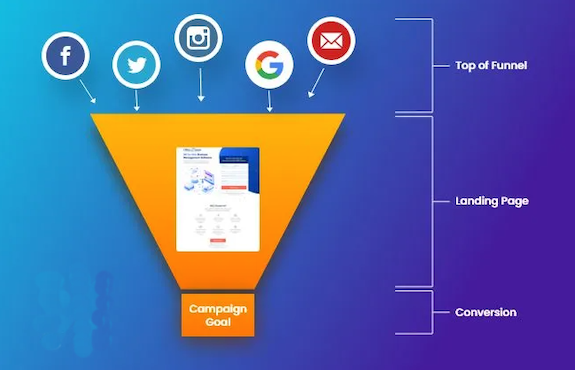
What are the main types of online advertising?
It's important to adapt your advertising message to the type of medium used to deliver the ad.
People using search engines have a specific purpose and are looking to solve a problem or meet a need. They may be looking for information on a specific topic and answers to their questions, researching and comparing types of businesses, products or services, and looking for directions on how to get to certain places.
On social media, people are more likely to want to pass the time and be entertained. Users can scroll through different publications without having a specific information-seeking goal.
Thus, a text ad in search engines needs to have a message related to the user's search intent. A social media ad, on the other hand, will attract attention if it is entertaining, intriguing or useful to the potential customer.
1. Search engine ads
Search engine ads are commonly known as pay-per-click (PPC) ads, meaning that the advertiser only pays when the ad is clicked. Traditionally these are text ads appearing in the first few search results, but their appearance has evolved greatly over time.
Google also now allows ads to be displayed in the form of product catalogs and text ads with images.
The platform used to create ads in Google search results is Google Ads. Basically, the strategy is to bid on keywords in order to have ads appear when a user uses the keyword in their search query.
Once again, the whole thing has evolved a lot since then. Google ads relies more and more on artificial intelligence and machine learning to target campaigns, pushing advertisers to target intentions and interests instead of precise keywords!
We're increasingly seeing a transfer of spending control from the advertiser to Google Ads.
Only a few years ago, the main strategy for getting qualified clicks (i.e. from potential customers, not just web surfers outside your market) was to use keywords with restricted targeting and granular campaign structures. Now, Google uses click conversion history more as targeting and can deviate from your parameters if Google deems that more conversions can be achieved.
It's therefore vital to keep an eye on campaign performance to ensure that the money spent on a conversion in Google's eyes also corresponds to a valuable conversion in your eyes!
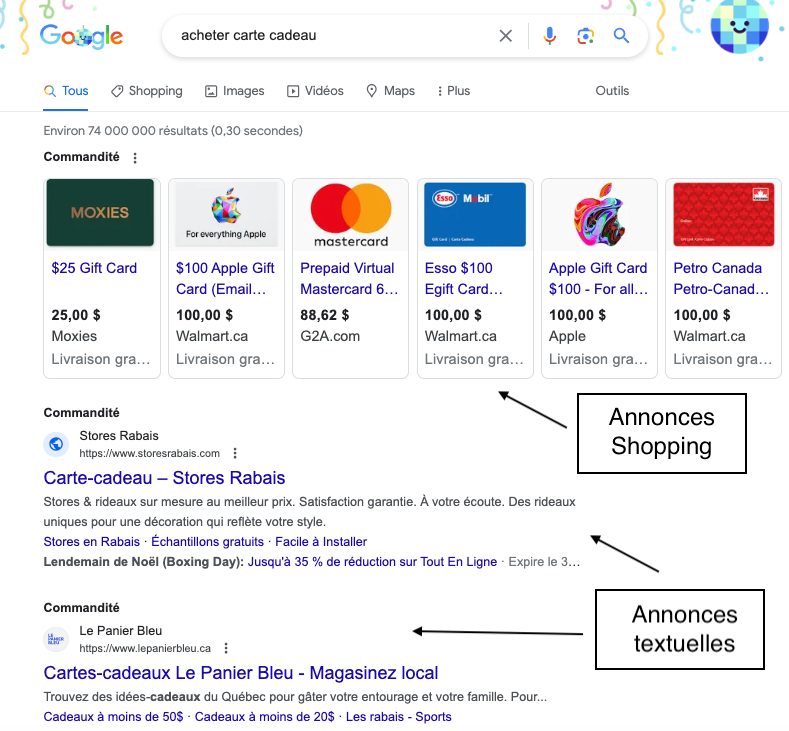
Automation is becoming increasingly important in search engine campaigns. Performance Max is a type of campaign offered by Google that automatically creates campaigns and ads from content available on your website.
These campaigns will be delivered in search results, Gmail, Google Maps, YouTube and websites on the Google network.
Since the machine can't necessarily guess what is a valuable action on your website, it's important to monitor these campaigns to make sure the money is being spent in the right places.
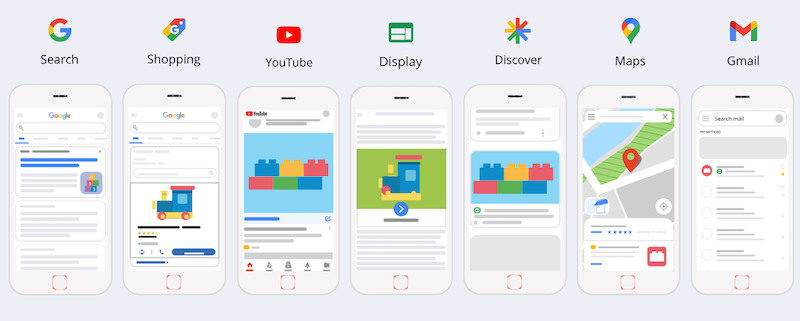
What's more, Google automatically applies a number of “optimizations” in its pursuit of conversions. These changes can sometimes work against you.
For example, Google may decide to target a new geographic market close to yours - its algorithm has detected that the profiles of people in this market are similar to your current customers.
But this market may be dominated by one of your competitors (which will explode your campaign costs), or not very accessible, for example if a river separates you and the nearest bridge is a considerable distance away.
Once again, you need to remain very vigilant during this era of omnipresent automation!
2. Website ads
Many websites display banner ads. These ads have different formats and locations, are purchased directly from the website or through an advertising platform such as Google Ads.
Usually these ads are purchased in CPM "cost per mille", which means the cost is for every 1000 impressions an ad receives. An impression is when the ad is visible in the browser.
The advertiser therefore doesn't pay per click on the ad, and even if the ad generates an impression there's no guarantee that the surfer saw it or paid attention to it.
This type of advertising can be a good strategy for generating brand awareness. Since the purchase is on a CPM basis, it's easy to run ads over and over again to the same people, which in advertising is called frequency.
In order to stand out from the crowd and stand out in the advertising noise, you often have to repeat, repeat, repeat.... At this point, when your potential customers think of a company in your industry, you're more likely to be among the advertisers they think of. Repetition leads to familiarity, and we're more likely to trust a brand we're familiar with.
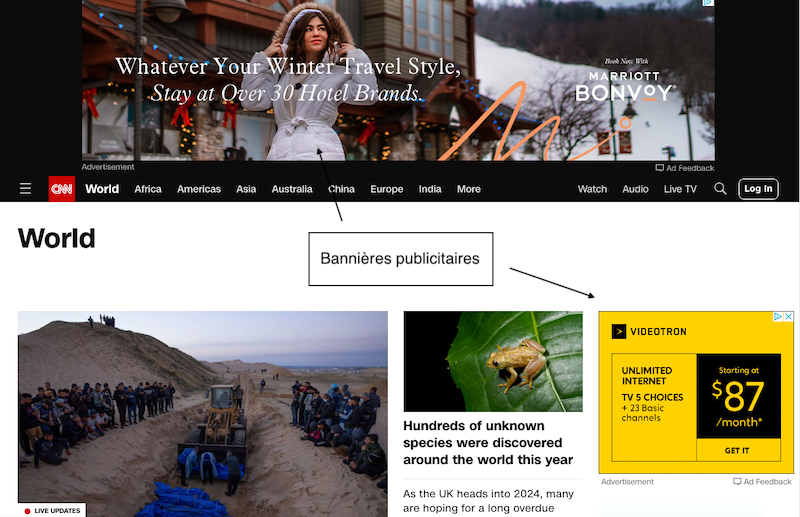
3. Social media ads
Facebook (Meta) allows the distribution of ads across its various properties (Facebook, Instagram, Whatsapp). Ads can be run directly from the company page, or through tools like Ads Manager, which offer more advanced targeting options and ad formats.
Meta has an incredible amount of information on its users' interests, making it possible to run ad campaigns targeting people with very precise interests and profiles. In this way, we avoid wasting money, as ads will only be shown to potential buyers.
Some advanced settings, such as audience creation from your current customers and pixel retargeting on your website, can enable you to make high-performing campaigns.
Meta has several properties on which your ads can run, so it's important to consider the different ad formats when creating your ads. For example, Facebook News Feed and Instagram Stories have very different image formats. Meta can automatically adjust the size of your ads, but this isn't ideal.
It's also recommended to create several variations of creative (text and image) for your campaigns. Meta will test several combinations and prioritize the ones that perform best.
In addition, we often observe a drop in performance when the same creatives are used over an extended period - creative fatigue. To remedy the situation, you can either target new audiences or change your creative.
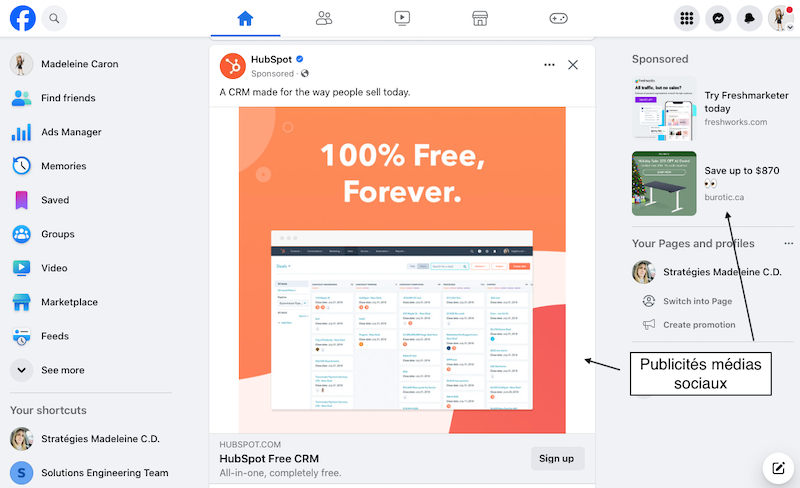
Digital advertising strategy and planning services
What's included in a digital advertising strategy?
A strategic digital advertising plan includes the following elements:
- Strategic analysis of your digital properties and competitors
- Recommendation of an advertising strategy on different channels according to your budget and internal resources
- Creation of advertising accounts and configuration of campaigns
- Go live with campaigns and monitoring of preliminary results
An agreement to manage and optimize campaigns for an extended period is possible.
Campaigns are created from your own digital properties, so you retain control and have access to the results at all times.
About Expert Digital Advertising Consultant Madeleine C.D.
In addition to my experience in the field, I hold a graduate degree from McGill University in Management, Internet Business.
I have over 15 years of experience in the digital marketing industry. I am based in the greater Montreal area and in Sorel-Tracy.
I have worked in several international agencies as a media planner for the digital strategy of major accounts such as Six Flags, Choice Hotels, various ministries and crown corporations of the Government of Quebec and Canada, Nissan and Hyundai.
I also benefit from extensive experience in the automotive industry having worked as a consultant and trainer for the implementation of digital strategy at both car dealerships and manufacturers.